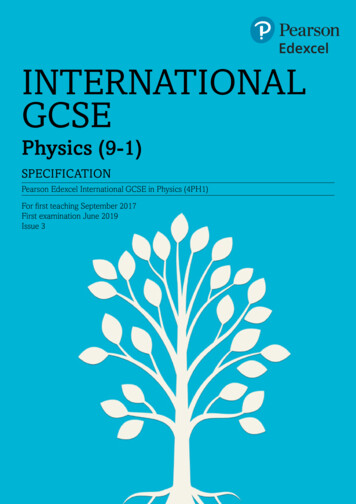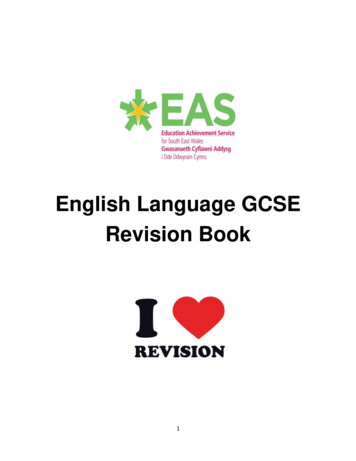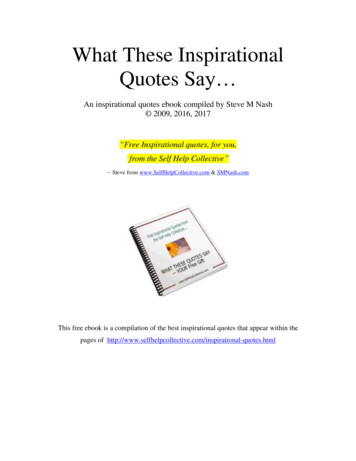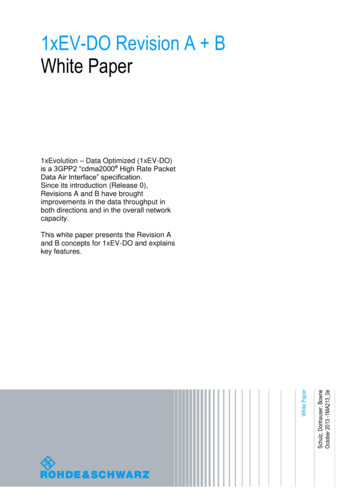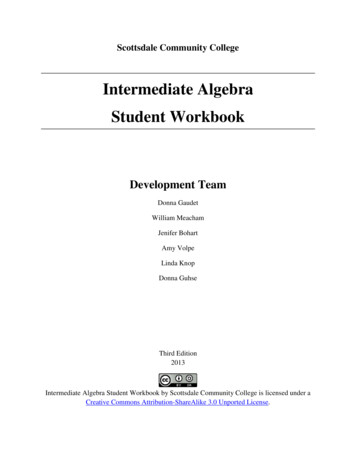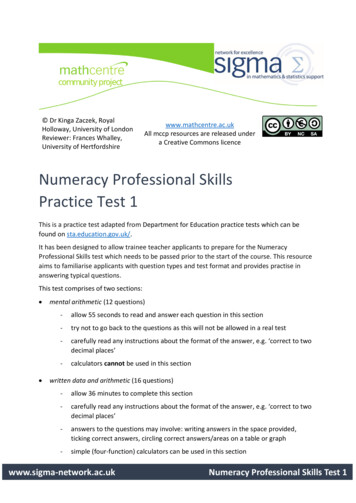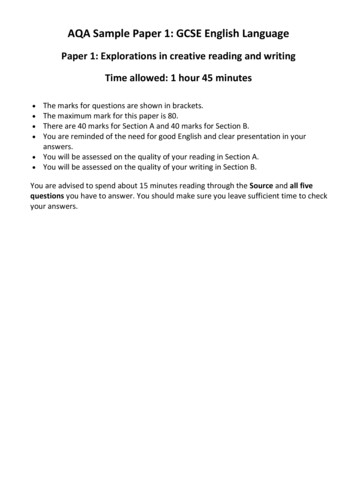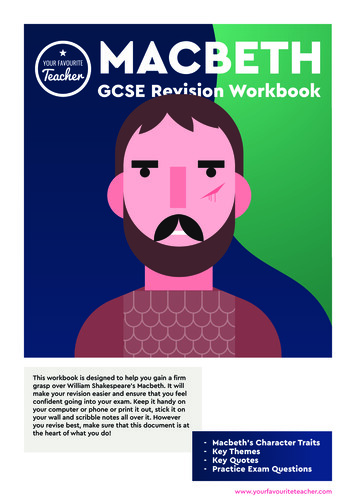
Transcription
MACBETHGCSE Revision WorkbookThis workbook is designed to help you gain a firmgrasp over William Shakespeare’s Macbeth. It willmake your revision easier and ensure that you feelconfident going into your exam. Keep it handy onyour computer or phone or print it out, stick it onyour wall and scribble notes all over it. Howeveryou revise best, make sure that this document is atthe heart of what you do!-Macbeth’s Character TraitsKey ThemesKey QuotesPractice Exam Questionswww.yourfavouriteteacher.com
Macbeth’s Character TraitsAmbitious:Macbeth is a brave warrior who is rewarded by becoming the Thane of Cawdorfor his bravery in battle. However, this doesn't satisfy his ambition as he desiresgreater power. Upon hearing the Witches' prophecy, Macbeth becomesobsessed with power which causes him to murder Duncan to claim the throne ofScotland. Macbeth is so driven by his own personal ambition that he acknowledges the flaws ofhis plan to kill Duncan and that it will result in his own demise, yet he lets his ambition cloud histhoughts and carries out the murder of Duncan. However as the play concludes, Macbeth loses hisambition as he rejects life having any significance, illustrating that personal ambition was hisdownfall.Brave:Macbeth is a brave warrior who is rewarded by becoming the Thane of Cawdorfor his bravery in battle. However, this doesn't satisfy his ambition as he desiresgreater power. Upon hearing the Witches' prophecy, Macbeth becomesobsessed with power which causes him to murder Duncan to claim the throne ofScotland. Macbeth is so driven by his own personal ambition that he acknowledgesthe flaws of his plan to kill Duncan and that it will result in his own demise, yet he lets his ambitioncloud his thoughts and carries out the murder of Duncan. However as the play concludes, Macbethloses his ambition as he rejects life having any significance, illustrating that personal ambition washis downfall.Brutal:Macbeth's dark desires and violent ambition overshadows all of his noblecharacteristics, his dark desires drove him to become a ruthless and calculatingkiller. Once Macbeth has the taste of murder, after being influenced by LadyMacbeth, the murders that follow come more easily to Macbeth as he secures hisposition as King. Macbeth has Banquo and Macduff's family killed because he thought they wouldthreaten his position as king. These brutal murders illustrate that Macbeth's ambition is muchgreater than his sense of morality, indicating that his nobility as a soldier has been surpassed byhis dark desires.Easily led:Macbeth is influenced by Lady Macbeth, she insults him saying he will be"more the man" if he kills Duncan. As a brave soldier these insults will angerMacbeth, since Lady Macbeth is questioning his masculinity. Consequently,Lady Macbeth's cunning behaviour persuades Macbeth to kill Duncan. Macbeth isvery easily led by the supernatural, especially the prophecy of the Witches. As the Witches'prophecies start to unfold, Macbeth's faith in them grows stronger and he becomes convincedthat what they say will come to fruition. Consequently, Macbeth refuses to go back to his originalways since it challenges the prophecy of the Witches.www.yourfavouriteteacher.com
Macbeth’s Character TraitsMoral:Towards the start of the play, Macbeth has a strong sense of right and wrong. Macbethfocuses a great deal on the consequences of his actions because of earth's "judgement"and the "deep damnation" following death. Macbeth is initially reluctant to kill Duncanbecause he knows that murder is wrong and that he is a good King. However, Lady Macbeth'sambition influences Macbeth and results in him murdering Duncan. But after Duncan's death, Macbethstruggles as he experiences waves of terrible guilt and remorse for his actions. This illustrates that despite hisviolent actions Macbeth can still comprehend that what he did was wrong.Notes:www.yourfavouriteteacher.com
Macbeth’s Key ThemesManhood:As a warrior, Macbeth exhibits very traditional masculine traits including bravery andstrength. When Macbeth fights he is seen to be a courageous warrior who is willing to layhis life down on the battlefield. Thus, Macbeth is awarded with the title of Thane ofCawdor by Duncan for his bravery in battle. However, all too often Macbeth's manhood iscalled into question by his own wife as she manipulates him to achieve her own ambition. As Lady Macbethpersuades her husband to kill Duncan, she insults his manhood by calling him a "coward" and says that he willbe "more the man" if he murders Duncan. Lady Macbeth's emotional blackmail of Macbeth results in himmurdering Duncan in an attempt to uphold his masculinity.Good and Evil:Macbeth is a noble character with a strong moral conscious who carries out evil deeds.Macbeth's nobility is recognised at the start of the play where Duncan makes him theThane of Cawdor after seeing Macbeth's potential for glory and greatness. However,Macbeth's ambition is so strong that it exceeds his virtue and allows his wicked desires toflourish. After this Macbeth becomes even more evil as he becomes accustomed to his dark desires and he isn'tfazed when orders the murder of Banquo and Macduff's family. Good and evil also encompasses the fight forthe crown of Scotland. Macduff raises an army to topple the evil King Macbeth to allow the throne of Scotlandto be pure and good once more.Kingship:Macbeth gained the throne of Scotland unlawfully by murdering Duncan and framingDuncan's son's Malcom and Donalbain. There is little that Macbeth is unwilling to do in hisdesire to become king. However, upon being king Macbeth cannot be described as agood ruler but rather as a tyrant. To consolidate his position as King, Macbeth orders Banquo tobe killed and Macduff's family too. Macbeth is undeserving of the title of King due to the way he gained thethrone and also because of the way he acts as king. Macbeth's reign as king causes disruption in the land ofScotland as the days turned to night and the horses began eating each other, indicating a imbalanced naturalorder. Consequently, this is why the throne of Scotland is eventually prised away from Macbeth in the finalbattle against Macduff's army.Supernatural:The supernatural visions that Macbeth has are used to remind Macbeth of the guilt of hisactions. Macbeth's visions are seen as ambiguous because they don't provide a clearmessage. Consider Macbeth's vision of the dagger, it isn't clear as to whether it isencouraging him to kill Duncan or warning him against killing Duncan. Supernaturalthemes are highlighted when Macbeth sees Banquo's ghost at a banquet. Nobody else cansee Banquo's ghost so it indicates that Banquo's ghost is merely the guilty conscience of Macbeth. Macbeth'svision of Banquo is frightening for Macbeth, his fear results in him babbling away as he loses control of hisspeech. Macbeth's continuous encounters with the supernatural suggest signs of madness as he is disturbedby the visions.www.yourfavouriteteacher.com
Macbeth’s Key ThemesLoyalty and Betrayal:Macbeth's loyalty is shown through his actions. At the start of the play, Macbeth is loyal tohis King and country as he fights for Duncan and gives him his "service and loyalty".However, this loyalty soon wanes as Macbeth lets his dark desires get in the way of hisloyalty as he betrays Duncan by murdering him. Macbeth's initial devotion and loyalty toDuncan makes the betrayal all the more shocking. As well as betraying Duncan, Macbeth also betrays his ownmoral conscience. Macbeth had a strong sense of right and wrong, but Macbeth's ambition seems to havetaken priority ahead of this eventually resulting in his own demise where he rejects the notion of life havingany significance at all.Notes:www.yourfavouriteteacher.com
Macbeth’s Key Quotes"Stars, hide your fires! Let not light seemy black and deep desires."Act 1, Scene 4Explanation:Macbeth has his own aspirations of taking power from Duncan, through murderous impulses afterhearing the Witches' prophecy, when he learns that Duncan is visiting the castle. When Macbethsays, "Stars, hide your fires!" he wishes to remain in darkness so that his "black and deep desires"can be hidden. Metaphors of light and dark are used here, the darkness is used to illustrateMacbeth's immoral desires and the light is used as a divine force that critique's Macbeth's actionsand desires."I have no spur to prick the sides of myintent, but only vaulting ambition, whicho'erleaps itself and falls on the other."Act 1, Scene 7Explanation:Macbeth questions whether he should carry out his plan to murder Duncan, he notes that he isbeing driven by his personal ambition rather than prioritising the good of his country. But Macbethisn't convinced by his own personal ambition and he begins to assess what is causing him to act inthis way and the consequences of this action. But ultimately, Macbeth recognises that he willignore this sense of reluctance and he "o'erleaps" himself, thus falling to the flaws of his ownambition."Is this a dagger which I see before me, the handle towardmy hand? Come, let me clutch thee; I have thee not, andyet I see thee still. Art thou not, fatal vision, sensible tofeeling as to sight? Or art thou but a dagger of the mind, afalse creation, proceeding from the heat-oppressed brain? Isee thee yet, in form as palpable as this which now I draw."Explanation:Act 2, Scene 1As Macbeth thinks upon his plan to murder Duncan, he sees a dagger floating in front of him andhe ponders whether the dagger is real or if it is a figment of his imagination. As Macbeth goes toclutch the dagger he finds that he cannot grasp it, this confuses him greatly since he notes that itis impossible to have such a vision yet he can see it so clearly in front of him, this is shown whenMacbeth talks of the dagger's "palpable" quality and how much it resembles his own sword. Thevision of the dagger leads Macbeth to question what is fictitious and what is reality, the vision ofthe dagger is merely a vision but it results in a truth of Macbeth's coming murder of Duncan.www.yourfavouriteteacher.com
Macbeth’s Key Quotes"I am in blood stepp'd in so far, that,should I wade no more, returning were astedious as go o'er."Explanation:Act 3, Scene 4When Macbeth says "I am in blood" he means that he is deeply involved in murder after killingDuncan and Banquo, Macbeth feels that the blood he has spilled is flowing around him and that heis beginning to drown in it, this is illustrated where Macbeth says, "should I wade no more". Theimagery of a pool of blood is used to show Macbeth's shame and guilt, Macbeth feels that his fateis sealed as a result of his actions and that nothing he can do will change this. Macbeth states thatreverting to his original ways would be "tedious", thus illustrating that he could turn away from hismurderous ways if he were more tenacious."Tomorrow, and tomorrow, and tomorrow creeps in thispetty pace from day to day to the last syllable of recordedtime; And all our yesterdays have lighted fools the way todusty death. Out, out, brief candle! Life's but a walkingshadow, a poor player that struts and frets his hour uponthe stage, and then is heard no more. It is a tale told by anidiot, full of sound and fury, signifying nothing."Act 5, Scene 5Explanation:As Macduff's army approaches for the final battle, Macbeth claims that life has no meaning and isjust a monotonous series of events ending in eventual death. Eventually Macbeth's ruthless naturehas caught up with him and he rejects the notion of his life having any significance whatsoever,this is shown when Macbeth commands, "Out, out, brief candle!".Notes:www.yourfavouriteteacher.com
Macbeth’s Practice Exam QuestionMacbeth Practice Exam QuestionsGrab a pen and paper, set a timer on your phone and see how you get on answering theseexample exam questions.1. How does the character Macbeth exhibit the theme of betrayal?2. How does the supernatural affect the character Macbeth?3. Explore the ambition expressed by the character Macbeth.4. Show how Shakespeare develops the character Macbeth.5. How does Shakespeare present the character Macbeth?6. Does Shakespeare present the character Macbeth as evil?Anything you didn’t feel totally comfortable with, or just want to re-visitsome of the key information in even greater depth?Head over to www.yourfavouriteteacher.com and sign up for a free trial to access ourMacbeth course, packed full of animated videos, quizzes, downloadable worksheets and more.As well as this you’ll gain access to over 60 English Literature, Language, Maths and Sciencecourses designed to help you ace your GCSEs.Sign up for a free trialwww.yourfavouriteteacher.com
Macbeth is influenced by Lady Macbeth, she insults him saying he will be "more the man" if he kills Duncan. As a brave soldier these insults will anger Macbeth, since Lady Macbeth is questioning his masculinity. Consequently, Lady Macbeth's cunni

